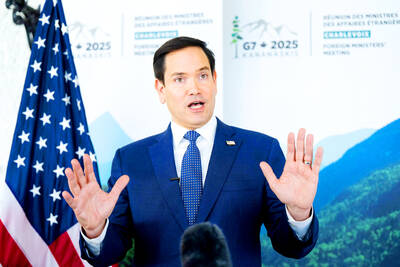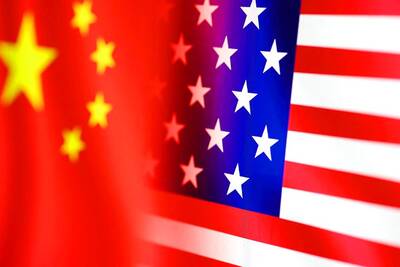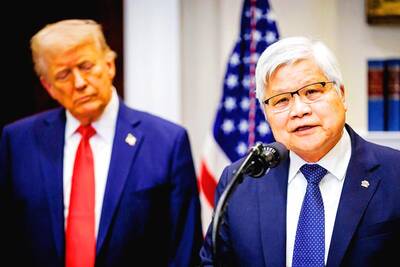The military has released a photograph of Minister of National Defense Wellington Koo (顧立雄) appearing to sit beside a US general during the annual Han Kuang military exercises on Friday last week in a historic first.
In the photo, Koo, who was presiding over the drills with high-level officers, appears to be sitting next to US Marine Corps Major General Jay Bargeron, the director of strategic planning and policy of the US Indo-Pacific Command, although only Bargeron’s name tag is visible in the seat as “J5 Maj General.”
It is the first time the military has released a photo of an active US general participating in a military exercise with Taiwan’s defense minister.

Photo courtesy of Military News Agency
However, the military later edited and replaced the photo, cropping out the name tag.
Bargeron was commanding general of the 3rd Marine Division from November 2021 to June 2023. During that time, he discussed many military exercises between the US and the Philippines, including Balikatan and Kamandag.
The US Joint Chiefs of Staff is divided into eight departments: J1 is labor and personnel; J2 is intelligence; J3 is operations; J4 is logistics; J5 is strategy, plans and policy; J6 is command, control, communications and computers; J7 is joint force development; and J8 is force structure, resources and assessment.
Bargeron serves under the J5 division as a director of strategic planning and policy.
Although Taiwan and the US typically keep a low profile when it comes to military collaboration, in the past few years, they have had increasingly frequent exchanges.
For example, retired rear admiral Michael Studeman visited Taiwan in April 2020, when he was director of intelligence of the US Indo-Pacific Command. At the time, the Presidential Office, Ministry of Foreign Affairs and Ministry of National Defense did not provide further comment on the visit.
In January that year, Brigadier General Matthew Isler joined the memorial service for a Black Hawk helicopter crash with then-American Institute in Taiwan director Brent Christensen.
During Friday’s exercises, Koo said he was focused on three key points: combining reasonable plans with practical verification, reviewing the force structure to develop asymmetric combat capabilities and monitoring warning signs for pre-emptive defense deployments.
Considering enemy threats and operational constraints, the military is reviewing weaponry, staffing resources, and mobilization and recovery forces to adjust defense strategies and revise joint operational plans, he said.
The Han Kuang exercises assess coordination between units, which would later be integrated into computer-assisted command post exercises and live drills, he said.
Senior officers should enhance assessment and decisionmaking skills through combat readiness drills, enabling them to escalate defense levels and issue mobilization orders when necessary, Koo said.
Forces should be reorganized based on actual capabilities, mission requirements, reserve expertise and force recovery timelines, he said.
Asymmetric, mobile, agile, precise and covert operational capabilities are crucial to ensuring the military can effectively meet defense needs, he added.
This year’s Han Kuang exercises have been extended to 10 days and nine nights.
In addition to sharpening the forces’ ability to respond to military and “gray zone” threats, the exercises would also assess the mobilization and formation of the army’s 206th Brigade, integrating it into live combat training, the military said.
Additional reporting by Aaron Tu and Wu Che-yu

‘CROWN JEWEL’: Washington ‘can delay and deter’ Chinese President Xi Jinping’s plans for Taiwan, but it is ‘a very delicate situation there,’ the secretary of state said US President Donald Trump is opposed to any change to Taiwan’s “status quo” by force or extortion and would maintain that policy, US Secretary of State Marco Rubio told the Hugh Hewitt Show host on Wednesday. The US’ policy is to maintain Taiwan’s “status quo” and to oppose any changes in the situation by force or extortion, Rubio said. Hewitt asked Rubio about the significance of Trump earlier this month speaking with Taiwan Semiconductor Manufacturing Co (台積電) chairman C.C. Wei (魏哲家) at the White House, a meeting that Hewitt described as a “big deal.” Asked whether the meeting was an indication of the

‘RELATIVELY STRONG LANGUAGE’: An expert said the state department has not softened its language on China and was ‘probably a little more Taiwan supportive’ China’s latest drills near Taiwan on Monday were “brazen and irresponsible threats,” a US Department of State spokesperson said on Tuesday, while reiterating Washington’s decades-long support of Taipei. “China cannot credibly claim to be a ‘force for stability in a turbulent world’ while issuing brazen and irresponsible threats toward Taiwan,” the unnamed spokesperson said in an e-mailed response to media queries. Washington’s enduring commitment to Taiwan will continue as it has for 45 years and the US “will continue to support Taiwan in the face of China’s military, economic, informational and diplomatic pressure campaign,” the e-mail said. “Alongside our international partners, we firmly

KAOHSIUNG CEREMONY: The contract chipmaker is planning to build 5 fabs in the southern city to gradually expand its 2-nanometer chip capacity Taiwan Semiconductor Manufacturing Co (TSMC, 台積電), the world’s biggest contract chipmaker, yesterday confirmed that it plans to hold a ceremony on March 31 to unveil a capacity expansion plan for its most advanced 2-nanometer chips in Kaohsiung, demonstrating its commitment to further investment at home. The ceremony is to be hosted by TSMC cochief operating officer Y.P. Chyn (秦永沛). It did not disclose whether Premier Cho Jung-tai (卓榮泰) and high-ranking government officials would attend the ceremony. More details are to be released next week, it said. The chipmaker’s latest move came after its announcement earlier this month of an additional US$100 billion

PERMIT REVOKED: The influencer at a news conference said the National Immigration Agency was infringing on human rights and persecuting Chinese spouses Chinese influencer “Yaya in Taiwan” (亞亞在台灣) yesterday evening voluntarily left Taiwan, despite saying yesterday morning that she had “no intention” of leaving after her residence permit was revoked over her comments on Taiwan being “unified” with China by military force. The Ministry of the Interior yesterday had said that it could forcibly deport the influencer at midnight, but was considering taking a more flexible approach and beginning procedures this morning. The influencer, whose given name is Liu Zhenya (劉振亞), departed on a 8:45pm flight from Taipei International Airport (Songshan airport) to Fuzhou, China. Liu held a news conference at the airport at 7pm,